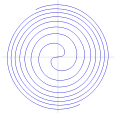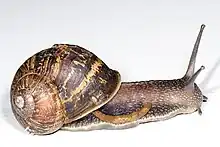 Traditional Mee Siput Muar with sambal | |
| Alternative names | Mee Siput |
|---|---|
| Type | Snack |
| Place of origin | Malaysia |
| Region or state | Muar, Johor, Malaysia |
| Main ingredients | Wheat flour, cooking oil |
 |
| This article is part of the series on |
| Malaysian cuisine Masakan Malaysia |
|---|
|
|
Mee Siput Muar or simply Mee Siput is a cracker which originated from and is commonly available in Muar, Johor, Malaysia.[1]
Mee Siput Muar is traditionally and originally hand-made of flour dough which was rolled, stretched into long noodle-like strips or strings before swirled in a circular spiral pattern to resemble the shell of a siput, or snail in Malay.[2] They are dried in the sun before being deep-fried in cooking oil until crispy and crunchy.[3] The ready-to-eat snack is best served with condiments like sambal, chili paste or chili soya sauce.[4] Beside its spiral snail-look-aliked shape which has contributed to the name of Mee Siput,[5] the so-called snail noodle cracker also has a crispy texture similar to the light, brittle feeling of a snail shell once it breaks in the mouth.[6]
In present times, the factory and machinery produced mee siput mostly were not made in the traditional "snail shell" form, but rather in a randomly swirled pattern due to mass production for durability, efficiency and commercial reasons.[7]
 Spiral-pattern shape of mee siput
Spiral-pattern shape of mee siput Look of a garden snail.
Look of a garden snail. A ready-to-eat original mee siput
A ready-to-eat original mee siput Present commercialised mee siput
Present commercialised mee siput
See also
References
- ↑ "Picks:So much more to Muar". New Straits Times. 26 October 2017. Retrieved 28 April 2018.
- ↑ "Mee Siput Infamous Snack Dominates Muar". Johor Now. 11 July 2017. Retrieved 15 November 2018.
- ↑ "Mee Siput" (in Malay). Tourism of Johor. 2015. Retrieved 10 December 2017.
- ↑ "Mee Siput Johor" (in Malay). Vocab Johor. 9 November 2020. Retrieved 6 April 2021.
- ↑ Shuziana Yunos (2014). "Asal Usul". shuzianayunos.wixsite.com (in Malay). Mee Siput Johor. Retrieved 28 April 2018.
- ↑ "Mee Siput". We Love Muar. Retrieved 15 November 2018.
- ↑ "Mee Siput". Anim Agro Technology. 25 February 2012. Retrieved 6 April 2021.